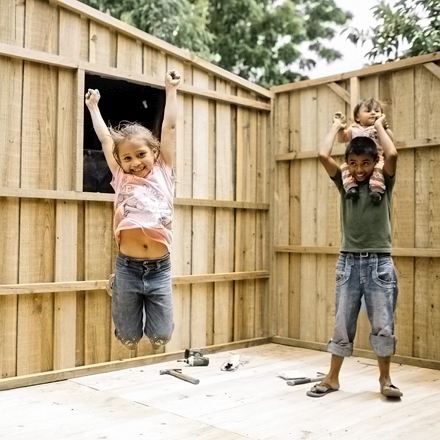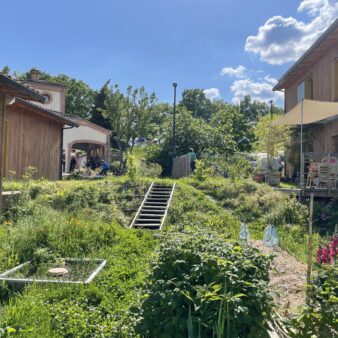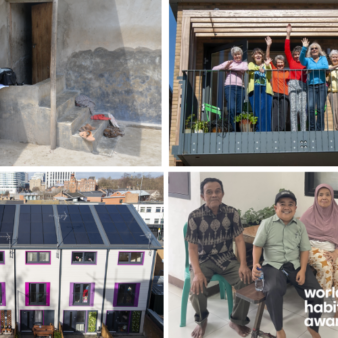
National Governments need to urgently meet the challenges posed by both the climate emergency and the need to fulfil the right to housing for everyone. And while many NGOs and local governments are responding to these challenges, the scale and urgency of these crises requires national governments to fund and legislate to provide and support solutions where they are needed.
This was the headline message from a special World Habitat event to celebrate and debate the remarkable achievements of our 2020 award-winning projects.
Housing professionals and volunteers from across the world heard from leading housing experts and project representatives from the 2020 World Habitat Award Gold winners:
- Newcastle City Council, UK who developed a ground-breaking approach to tackle homelessness and has prevented 24,000 households from becoming homeless.
- The Aga Khan Agency for Habitat, Pakistan who worked on the frontlines of the climate emergency to empower rural indigenous communities in using key technological climate adaptation tools.
We were also joined by the winners of the very first Outstanding Contribution to Housing Award, which recognises the incredible work of youth-led organisation TECHO, providing safe and secure emergency housing to many thousands of people in 18 countries in Latin America and the Caribbean.
David Ireland, Chief Executive of World Habitat, started the discussion, picking up on the point made by Maimunah Mohd Sharif, Executive Director of UN-HABITAT (who partner World Habitat in the running of the World Habitat Awards) about how, “climate change is a poverty multiplier”, and how, “we need a ‘pro-poor approach’ to planning, building [and] emulating cities.” David said that this illustrated how poor housing and the climate emergency is everyone’s responsibility.
Neil Munslow, from Newcastle City Council commented that what struck him was “whether it’s in the UK or elsewhere – such as Pakistan – the impact of losing your home is the same wherever you are.” He added that their work to prevent homelessness has, “prevented over 24,000 households becoming homeless since 2014. Poverty and deprivation were long-standing issues before a decade-long programme of austerity reduced municipal budgets by almost a third and welfare spending was severely cut.”
Responding to this, Christophe Lalande from UN-HABITAT, said: “This battle against homelessness [can] really bring value to other cities and other mayors in the European region. Homelessness has been at the core of [our] work for the past two years. Newcastle has been very illustrative for us to influence other policymakers to prevent…homelessness but also to better understand what is actually at stake. By promoting this type of practices, we are really making a change at a global level, and Newcastle [City Council] is really leading by example with this evidence-based policy, by bringing all the partners together to fight against homelessness and I think it is very, very inspiring.”
Global Director of The Shift and World Habitat Awards Final Judge Leilani Farha, added, “It’s extraordinary what Newcastle [City Council] has done…[it’s] really unique. Homelessness is a prima-facie violation of the right to housing. And that’s because it intersects so clearly with the right to life – one’s morbidity and mortality is decreased if you’re homeless – rights to dignity, rights to education, rights to employment. In that fundamental way, trying to prevent homelessness is a human rights act. City governments and all governments should be striving as hard as they can to prevent homelessness because it is a fundamental violation of human rights.”
She continued, “But Newcastle goes way beyond that, in that the model is holistic and integrative. It understands that there are many moving parts that create homelessness…and only by embracing all of them and all actors working together can homelessness be prevented. It is a model…for other cities…getting the moving parts to collaborate and work together is no easy task.”
Onno Ruhl, who’s work with the Aga Khan Agency for Habitat is helping to protect communities living on the front-line of the climate emergency in Pakistan said, “There are a billion people living in the broader mountain areas, so we want to learn from others who work there, share our knowledge, and make the conservation and improvement of the habitat of the mountain communities an important driver in the fight against climate change and the fight for climate adaptation.”
He continued: “It is crucial that we allow these people to build a better future where they are. We have to adapt to the climate…but there’s no reason why housing can’t improve as a result of that adaptation. It doesn’t have to mean catastrophic consequences for people – but only if we do act.”
Responding to Onno, Leilani Farha said, “Indigenous knowledge is often appropriated without acknowledgement – that was not the case here, it was understood that it is indigenous knowledge that was being harnessed. And what is interesting is that it was side by side with…the most modern technology and that’s something you don’t see. A lovely interaction between indigenous knowledge and new ways of thinking, and new ways of doing things through digital means.”
Dr Claudia Murray, from the University of Reading, talked about how TECHO has reached such a size now, “it’s impossible for Governments to ignore them.” She also praised them for how they… “provide skills and empower communities in the region. They help communities understand their right to shelter. They give them a voice, or help them find their voice.”
Dr Murray also challenged TECHO to consider what’s next for them, to perhaps become a housing association or to upscale solutions like Community Land Trusts.
Hector Guarda of TECHO, talked about how they have provided emergency housing, but that they “have to work for a better Latin America where people have access to dignified homes. There are millions of families in Latin America today who do not even have a solid floor on which to begin to dream. We know that emergency housing is not the definitive solution, but it is a firm floor on which to begin to dream. Our challenge is to give families access to a dignified permanent home, with access to city services, health, education, culture and leisure…We want other places to look at Latin America as a place of opportunities.”
In response to a question from Dr Murray about whether they were doing the work that governments should be doing, because “governments are ignoring the most vulnerable situations just because TECHO is picking up the problem”, Hector Guarda replied, “We are not here to replace governments, but there are tasks that governments do not do and we are not going to wait for them.”
Leilani Farha added that: “TECHO is playing an essential role, it does it well, it’s close to the people. The[y] bring visibility to the invisible. The[y] [provide] recognition of those ‘without’. You don’t want TECHO to stop playing that role, but governments need to understand that the primary responsibility for implementing human rights lies with governments and where that is being done by another actor – that actor needs the resources and competencies to do that well. And to do it in a way that has a long-term impact. This is the case in many countries…NGOs are playing a really significant role, but they are not always empowered to do so.”
Following the event, David Ireland, said:
“What became very clear from individuals and organisations working across the world is that governments are not responding quickly enough to the scale of urgent housing need. The way in which an organisation like TECHO has so quickly expanded their geographical scale to reach so many people in housing need is what’s needed. Unfortunately, too many governments are slow to respond or are happy to sit back and let NGOs – like TECHO and Aga Khan – fill the gap. The urgency of the climate emergency and global housing crisis leaves no time for sitting back. The time for co-ordinated action between governments and NGOs is now.”
He added:
“The types of challenges that face the housing sector right now are of a scale that we’ve not seen before. Looking ahead to COP26 – we all want governments to agree on actions to limit the climate crisis. But to implement those actions the housing sector will have to transform, delivering more low-cost homes with net-zero emissions or better. Governments urgently have to create the legal and financial conditions for this to happen.”
David Ireland ended on an optimistic note however:
“The projects and programmes we have awarded give me hope. Because, firstly, they show there are people out there who are already solving the problems and secondly they prove that innovations can be scaled up to global solutions.”
You can view the film celebrating the remarkable work of our 2020 award-winning projects here.
And you can view the event discussion here.
And if you know of a project that we should encourage to enter, please contact us at: wha@world-habitat.org




Join the discussion